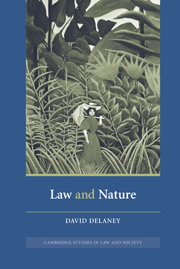Book contents
- Frontmatter
- Contents
- Acknowledgments
- Part I Situating nature
- Part II Rendering nature
- 6 It's a slippery slope: law and the forces of nature
- 7 Doctrinal wilderness and the path of interpretation: law and wilderness
- 8 Wild justice and the endangerment of meaning: law and endangered species
- 9 Puka's choice: law and animal experimentation
- 10 Fear of falling: law and bestiality
- 11 The births of nature and tradition: law and reproductive technologies
- 12 Doctrinal mutations at the edge of meaning: law and genetic screening
- 13 Return of the beast within: law and biological criminal defenses
- 14 Controlling dreams: law and the involuntary medication of prisoners
- Part III Judging nature
- References
- Index
9 - Puka's choice: law and animal experimentation
Published online by Cambridge University Press: 22 July 2009
- Frontmatter
- Contents
- Acknowledgments
- Part I Situating nature
- Part II Rendering nature
- 6 It's a slippery slope: law and the forces of nature
- 7 Doctrinal wilderness and the path of interpretation: law and wilderness
- 8 Wild justice and the endangerment of meaning: law and endangered species
- 9 Puka's choice: law and animal experimentation
- 10 Fear of falling: law and bestiality
- 11 The births of nature and tradition: law and reproductive technologies
- 12 Doctrinal mutations at the edge of meaning: law and genetic screening
- 13 Return of the beast within: law and biological criminal defenses
- 14 Controlling dreams: law and the involuntary medication of prisoners
- Part III Judging nature
- References
- Index
Summary
INTRODUCTION
What is it like to drill into the shaved head of an unanesthetized baboon who is strapped to a table? As a workaday task what are the challenges, the dangers, or rewards? Is it best done, do you suppose, in the early morning or, perhaps, late in the afternoon? What is it like to be the baboon? Is that an intelligible question? Who's to say?
Sociologist Arnold Arluke conducted an ethnographic study of different primate laboratories and found a variety of ways of situating oneself with respect to captive animals (Arluke and Sanders 1996). Some laboratories had developed a culture of abuse and terror where technicians – or “cowboys” as they called themselves – related to monkeys in a manner not unlike sadistic prison guards to inmates. In Arluke's view a principal task in these laboratories was maintaining the difference between “them” and “us” through continual displays of dominance. In other laboratories, however, he found a culture more like that of a nursery school in which the technicians formed emotional bonds with specific animals. They played together, ate meals together, and cared for each other. The relationships here were patterned on the nurturing relations of human adults and children. Technicians in these laboratories professed strong ambivalence about the whole enterprise of primatology.
Films distributed by People for the Ethical Treatment of Animals (PETA) such as Unnecessary Fuss depict episodes of gratuitous abuse of primates (Francione 1995).
- Type
- Chapter
- Information
- Law and Nature , pp. 213 - 234Publisher: Cambridge University PressPrint publication year: 2003



